People get swimming pools for a few reasons. Some get one to keep their kids busy and some to exercise in. Some get them for pool parties and others to have a place to chill out and get a tan. Regardless of the various reasons, everyone wants the water to be refreshing. And in case you don’t know yet, some pools are not always as refreshing as people want them to be.
Come to think of it, what’s considered refreshing pool water anyway? Certainly what’s refreshing to some is not to others. While living in a transient town like Orlando for almost all of my life, I’ve seen the pattern of people coming here from somewhere “up north” and enjoying what the rest of us consider frigid pool water. After they live here for a couple years, their bodies eventually come to their senses and they stop swimming in seventy degrees pool water.
Kids don’t care about pool water temps. They will jump in and swim while shivering with blue lips and act like they barely notice. The opposite seems true when we get much older. Elderly people tend to like the pool water to be like a bath. While I had a pool service, I had my share of pools owned by older people who heated them in the summer to keep the water temperature at 90 degrees or above. That’s not at all refreshing, plus a warmer pool requires more chemicals, but that’s another blog post.
If you’re still reading you may be asking, “What the hell is Dan talking about?” Why does pool water temperature matter? Well, let me tell you. It matters in a lot of cases. It just isn’t something most think about when first getting a swimming pool. It could matter later, though, after you’ve had the pool for a while. Here’s a rundown on why it matters and what you can do about it if your pool isn’t the temperature you want it to be. Heaven forbid.
What Makes a Pool Too Warm?
In thinking about it, there is really only one natural thing that makes pool water too warm and that is too much direct intense sunlight. In the summer, pools that have no shade and get direct sun all day long will warm up and feel like a bath. There is something about the sun beaming down directly onto the pool that causes it to heat up more than you might think. Cloudy days can really help cool the pool water down, but just one of those “not-a-cloud-in-the-sky” days can warm the pool up to an unrefreshing level.
The only other way a pool gets too warm is if it has a heater and it doesn’t turn off at the set temperature or the elders in the household have turned it up. That’s a much easier fix than if the sun is heating up the pool. You can always turn off or bypass a defective heater or threaten your aging parents with shipping them to a nursing home, if they touch the pool heater thermostat again. Just kidding. Mostly.
What Makes a Pool Too Cold?
Swimming pools that are too cold is a much more common problem than them being too warm. Even here in Central Florida, a big percentage of pools are too cold for their owners – even in the summer. If you live somewhere where it snows, you might be asking, “Why”. How can a swimming pool in Florida be too cold in the dead of summer? Well, there are a couple of things that cause it, but by far the main cause is a thing called a screen enclosure.
Screen enclosures for swimming pools are great. I wouldn’t have one, but they are great. They keep the pool cleaner from things blowing in and offer a feeling of being more indoors. The screens keep a lot of things out from the outside world including direct sunlight. You may not think just a screen would matter much in terms of taking away the sun’s intensity, but it really does. The vast majority of pools that are screen enclosed are too cold for me to want to swim in them, even in July.
Trees are the other big culprit in keeping pool water cold. If a pool has a canopy of trees directly over it, its water will be cold. Some trees are better than others for blocking out the sun with oak trees being number one. Big oaks are beautiful, but you may learn to hate yours if they are hovering over your pool. Other trees like pines, elms, and maples are better as they let more sunlight through, but the pool will still be chilly.
What to Do If Your Pool Is Too Warm
Creating some shade between the pool and direct sunlight is the key to cooling a pool down. In the long term, you can plant trees strategically so they will eventually provide shade over the pool. You can also install a vinyl canopy partially over the pool or at least where the sun shines on the pool or have some cover of some kind to block some of that midday sun.
Swimming pool chillers work pretty well I hear. They aren’t too popular yet as they are on the pricey side. I have seen some cool their pool’s water down temporarily during a pool party by using ice blocks. This I don’t advise, but it could be refreshing as long as no one runs into a floating ice block in the pool.
What to Do If the Pool Is Too Cold
If your pool is screened in, then getting a pool heater is your only option to warming the pool. The heater types are solar, electric heat pump, and gas. All three have advantages and disadvantages, but a heat pump is the one I usually recommend.
If you have a lot of trees covering the pool from the sun, then cutting them back and away from the pool will help quite a bit. Cutting some trees completely down will help even more, but few want to chop down a big tree.
On Above Ground Pools
OK, so I didn’t mention above grounds on this topic, but there’s a reason. The reason is that there really isn’t much of a difference in water temperature between in-grounds and above grounds. Above ground pools can get a little warmer and a little colder than in-grounds, but not as much as some think.

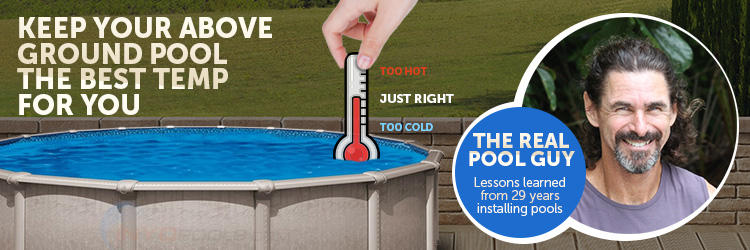



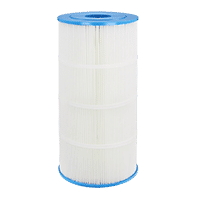
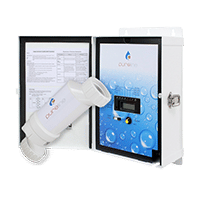
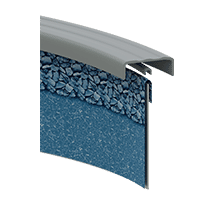

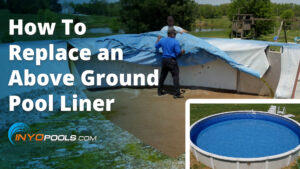


Leave a Reply